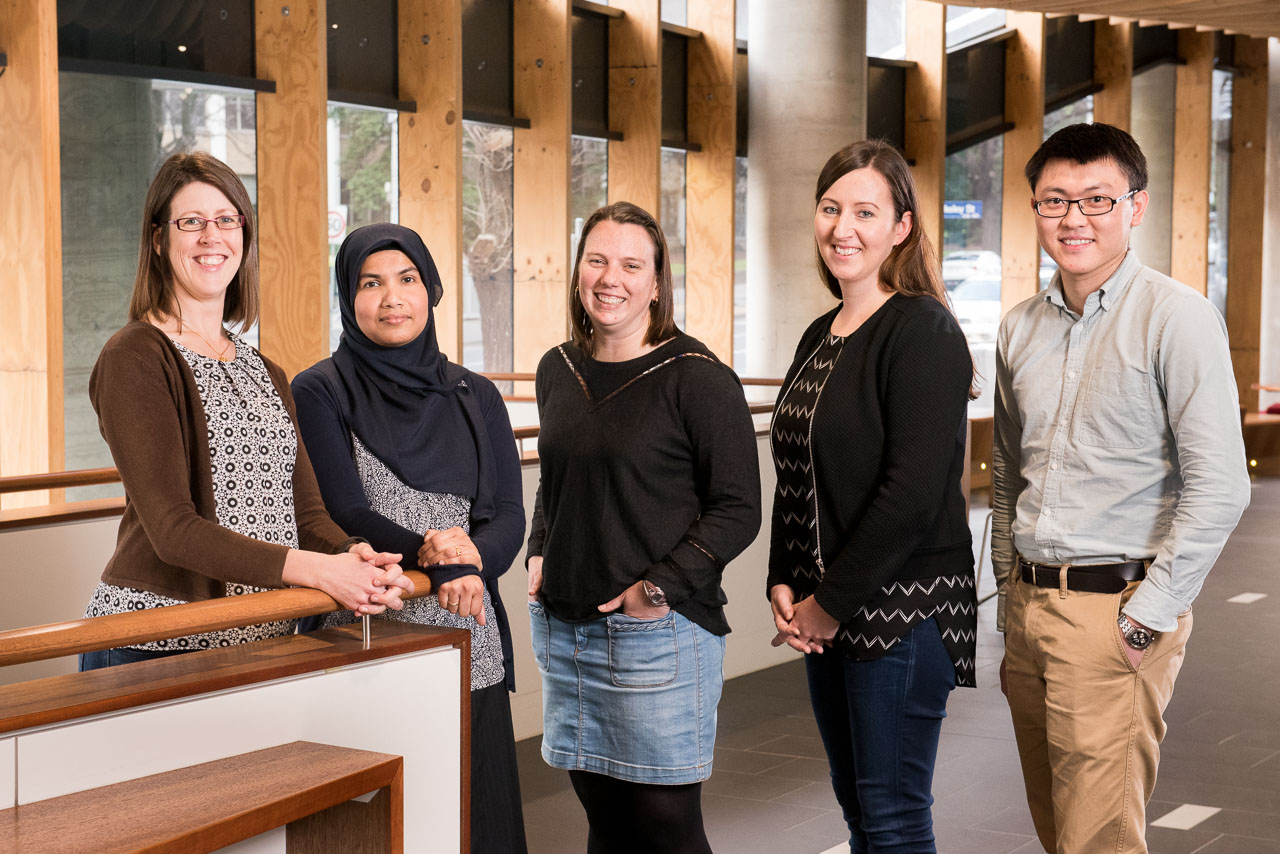-
Research Groups
Clinical Research
-
Chibo Group
The HIV Characterisation laboratory performs testing to monitor HIV-infected individuals prior to and upon commencement of antiretroviral treatment. Additionally, genotype-assisted antiretroviral resistance testing is available, which identifies the presence of drug resistance mutations so that targeted treatment choices can be made.
Current Projects
-
Analysis of transmitted HIV drug resistance to the newest class of antiretrovirals
Baseline genotyping of the virus infecting an HIV-positive individual is part of standard-of-care treatment. It reveals that transmitted drug resistance (TDR), typically to protease and reverse transcriptase inhibitors, continues to be important for the management of HIV infection. The increasing use of integrase inhibitors raises concern that TDR to this class of antiretroviral drugs may also occur. Analysis of genotyping data from this cohort will provide insight into whether there has been transmission of virus resistant to this new class of antiretrovirals to newly infected individuals and also provide recommendations for management and treatment of people infected with HIV-1.
-
Epidemiological trends in HIV in Victoria among persons not reporting male-to-male sex
In Victoria, the HIV epidemic is largely dominated by transmission through networks of men who have sex with men (MSM). Accordingly, surveillance and guidelines for testing and prevention are largely focused on this population. In collaboration with the Burnet Institute, Doris’ group aims to characterise epidemiological trends in non-MSM HIV notifications in Victoria in order to better understand the needs of diverse populations who may be at increased risk of HIV acquisition and transmission.
-
Mapping the molecular epidemiology of HIV-1 infection in Australia
The HIV Characterisation laboratory is involved in an Australia-wide project aimed at investigating the application of molecular epidemiological tools to assist the understanding of HIV genetic diversity and transmission patterns through the analyses of HIV cohorts in NSW, Victoria, Western Australia, South Australia and Queensland. Understanding the ongoing changes in the genetic diversity of the HIV epidemic has important implications for transmission dynamics, diagnostics, antiretroviral drug resistance and disease progression. This unique clinical and public health initiative aims to improve clinical outcomes and monitor HIV transmission patterns to inform HIV prevention and management in Australia.
-
Molecular Epidemiology of HTLV-I in the Northern Territory
Human T-cell lymphotropic virus type 1 (HTLV-1) infects approximately 10-20 million people worldwide, with clusters of high endemicity in certain geographic areas or ethnic groups, including central Australia. Seven subtypes have been described including the Australo-Melanesian subtype C (HTLV-1c). With limited sequence information available, Doris’ group seeks to investigate the molecular epidemiology of this virus in Australia. Phylogenetic analyses of LTR and envelope sequences confirm the clustering of the Australian subtype with HTLV-1c. When compared to sequences collected from a patient in 1988, there is very limited genetic variation, indicating that the virus has remained stable over time.
-
Temporal changes in the prevalence of HIV drug resistance mutations
The advent of highly active antiretroviral therapy (HAART) in the late 1980s has seen significant reduction in the morbidity and mortality rates of people living with HIV in Australia. The development of antiretroviral resistance and cross-resistance to more than one drug in a given drug class has made treatment management challenging. Using an antiretroviral drug resistance mutation database established at VIDRL since 2001, Doris’ group seeks to investigate the changes in HIV drug resistance mutation frequencies and determine if these changes coincide with changes in doctors’ drug prescribing habits over time.
Lab Team

-
Megan Gooey
-
Jodie D’Costa
-
Nicole Richards
-
Rizmina Sameer
-
Elaine Lee
-
Kent Group
Stephen’s group studies immunity to HIV, influenza and SARS-CoV-2. They are analysing a variety of vaccine strategies, including nanoparticle-based vaccines. They are studying a series of immune responses to gain better insights into protective immunity to important viral pathogens. They are developing monoclonal antibody therapies for HIV, influenza and SARS-CoV-2 to improve the treatment of these infections. The Kent group works very closely with Dr Amy Chung’s laboratory at the Doherty Institute.
Other work areas include:COVID-19, Immunology, Influenza
-
Nicholson Group
Suellen's group fulfills a dual mission of providing a technically first class, reliable diagnostic, reference and public health service to the healthcare system, and being an innovative, adaptable, forward-looking component of the scientific community and a valued collaborator in research projects, not just in Victoria, but nationally and in the region.
Other work areas include:Hepatitis
-
Purcell Lab
Professor Damian Purcell’s research group investigates the HIV-1 and HTLV-1 human retroviruses that cause AIDS and leukaemia/inflammatory pathogenesis respectively. The lab studies their genetic structure and gene expression with a focus on defining the mechanisms that control viral persistence and pathogenesis. The molecular interplay of viral and host factors during viral infection and the innate and adaptive immune responses to viral infection are examined. These molecular insights are used to develop new antiviral and curative therapeutics, preventive prophylactic vaccines and passive antibody microbicides and therapeutics. Some of these patented discoveries have been commercialised and we are assisting with clinical trials.
Other work areas include:COVID-19, Immunology, Viral Infectious Diseases, Bacterial and Parasitic Infections
Clinical research in HIV at the Doherty Institute is focused on understanding the barriers to curing HIV infection and developing therapeutic strategies to overcome these. In addition, the Doherty Institute has an active translational research program aimed at understanding how the immune system recovers following treatment of HIV infection and the impact of co-infections that occur commonly in low income countries, including hepatitis B virus (HBV).
Researchers are conducting a range of observational studies understanding where the virus hides on antiviral therapy (ART), and using blood and tissue samples collected from HIV-infected participants they are identifying new drugs that activate or eliminate the virus. Other observational studies are investigating the interaction of HIV and HBV, cytomegalovirus and Cryptococcus, the frequency of HBV drug resistance in HIV-HBV co-infection, and the impact of immune activation on immune function and liver disease following ART. In addition, researchers are leading a range of multi-site local, national and international interventional studies to investigate new interventions that may eliminate persistent virus.
Some of the Doherty Institute’s key collaborators in clinical research activities include the Department of Infectious Diseases at the Alfred Hospital; University of California San Francisco, San Francisco, USA; the Thai Red Cross, Bangkok, Thailand; and the University of Malaya, Kuala Lumpur, Malaysia.
If you are interested in volunteering in the Doherty Institute's clinical trials, please see the projects that are now recruiting volunteers.
Now recruiting volunteers
-
HIV
Do you have HIV and about to undergo immunotherapy for cancer?
Volunteers needed for a study where extra blood tests will be taken during immunotherapy treatment for cancer.
Current projects
-
Hepatitis HIV
A surveillance program for the detection of hepatitis B virus (HBV) resistance to tenofovir (TDF) in HIV-HBV co-infected patient
-
HIV
Circadian HIV RNA Oscillations and Outcomes of Stress (CHRONOS)
-
HIV
Dolutegravir intensification study (DIORR)
-
HIV
Would you like to take part in a study to see where HIV hides in the body?
-
HIV
Imaging the reservoir (iPHOTO3)
-
HIV
Investigating the effects of interferon on HIV persistence in HIV infected patients on ART
-
Hepatitis HIV
Long-term persistence of HIV in the liver and the clinical impact on HIV-HBV co-infection (CHHANEL)
-
HIV
The START HIV-1 Reservoir Sub-study
-
Hepatitis HIV
Towards a Functional cure for HBV: exploiting lessons from HBV-HIV co-infection
-
HIV
Interested in HIV cure research? (Vitamin D study)
Volunteers needed for a clinical trial to test whether high dose vitamin D can reduce HIV that persists despite antiretroviral therapy.
-
HIV
Would you like to help researchers eradicate HIV?
Volunteers needed for a study where large volume of white blood cells are collected to understand where HIV hides on treatment and how to get rid of HIV from its hiding place.
-
More in HIV
36.9
million
people are infected with HIV
2
million
new infections in 2014





